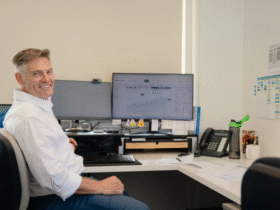Pursuing higher education can involve substantial financial commitments and a considerable investment of time and effort. Yet a well-chosen academic path often yields significant returns. Studies consistently demonstrate that additional credentials and specialized knowledge lead to broader career horizons, higher wages, and increased adaptability in an evolving economy. The notion of investing in yourself through education, therefore, becomes a strategic decision rather than a mere personal aspiration.
This article examines why education remains integral to professional growth, how modern financial instruments such as private student loans fit into the picture, and how a mindful approach to financing can ensure that the long-term benefits surpass the upfront costs. By exploring these factors, both rising professionals and organizations that support continued learning can better appreciate the tangible gains that accompany purposeful educational pursuits.
Building a Competitive Edge
In a marketplace that is growing more global and technology-driven, expertise and adaptability stand as valuable currencies. Education fosters these qualities by equipping learners with the skills and perspectives needed to tackle challenging roles and responsibilities. Whether this means delving deeper into data analytics, refining leadership capabilities through an MBA program, or mastering new software applications, the continuous pursuit of knowledge keeps individuals competitive and relevant.
Companies, in turn, recognize the value of employees who bring current, specialized skill sets to the table. Staff members who engage in ongoing training or advanced studies tend to demonstrate initiative and commitment, qualities that often lead to better project outcomes and a stronger sense of collaboration. For organizations, supporting employees’ educational endeavors—through reimbursement programs, partnerships with local colleges, or structured mentorship—can yield a more agile, innovative workforce.
Long-Term Financial and Career Benefits
While the upfront price of tuition and related costs may be daunting, particularly for mid-career adults balancing family and mortgage obligations, the payoff of a well-chosen educational program often justifies the expenditure. Data consistently shows that higher levels of education correlate with stronger earning potential. Even modest increases in annual salary, when accumulated over decades, can translate to a substantial return on investment.
Beyond salary considerations, educational credentials can open pathways to more engaging roles or leadership positions, fostering both financial and personal rewards. Professionals armed with advanced degrees or specialized certifications typically have greater mobility within their fields, expanding their options for pivoting or climbing the corporate ladder. Though the price tag of education may seem steep, analyzing the broader arc of a 20 or 30-year career illustrates how increased opportunities can offset initial expenses and spur ongoing advancement.
Strategic Use of Technology and Resources
Over the past decade, the ways people acquire education have diversified. Online courses, hybrid programs, and evening classes accommodate working professionals aiming to upskill without sacrificing full-time employment. This shift widens the pool of qualified learners, allowing many to progress academically while still supporting their families. Employers, too, benefit from these flexible formats, as they no longer lose valuable team members to campus commitments for extended periods.
Digital tools such as virtual labs, interactive simulations, and cloud collaboration further enrich the learning experience, bridging gaps between academic theory and real-world application. Students regularly solve complex problems that mirror business scenarios and then share insights with professors, peers, and mentors. Graduates emerge not only with credentials but with genuine readiness for tasks they will face in the workplace. Such synergy strengthens the argument for education as a key ingredient in building a skillful, forward-looking workforce.
Private Student Loans
Financing the cost of academic programs can prove challenging, especially for those pursuing advanced degrees or certifications. While federal student aid remains a go-to option for many, private student loans have become a viable complement when federal loans and scholarships don’t fully cover expenses. These loans, offered by banks and specialized lenders, can bridge gaps in tuition, housing, or materials without requiring borrowers to rework entire budgets or tap into personal savings.
Private student loans typically come with variable terms and interest rates influenced by the borrower’s credit history or co-signer arrangements. Selecting the right lender calls fora careful comparison of factors such as repayment flexibility, rate adjustments, and any special benefits like grace periods or interest rate reductions for consistent on-time payments. As part of a broader education finance strategy, private student loans can help ensure that individuals access top-tier programs and meet degree requirements without crippling financial strain. However, it’s crucial to weigh the long-term impact of these debts, forecasting how monthly payments fit into career plans.
Personal Development and Networking
A factor sometimes overlooked in discussions about education costs is the network a student forms. Postsecondary programs often place learners in contact with professors, mentors, and peers destined to become future colleagues or collaborators. Such relationships can spark entrepreneurial partnerships, job referrals, or ongoing professional support. In many cases, the intangible benefits of belonging to an alumni network can far exceed the initial financial outlay.
Beyond the pragmatic, enrolling in higher education exposes individuals to new perspectives, encourages critical thinking, and broadens cultural awareness. This intangible depth can enrich creative problem-solving and negotiation skills that serve well in the corporate arena. As organizations increasingly seek leaders who demonstrate emotional intelligence, these intangible advantages of education—such as empathy, adaptability, and global understanding—enhance a professional’s capacity to connect with diverse teams and markets.
Aligning Education with Career Goals
Education becomes more meaningful when it aligns with strategic career objectives. Before taking out loans or enrolling in programs, professionals should conduct a thorough self-assessment of how the curriculum complements their occupational direction. Evaluating whether the targeted credential aligns with the company’s or industry’s needs can help maximize the return on investment.
An effective plan might involve consulting career advisors, discussing aspirations with mentors, and reviewing internal job postings. If the aim is to transition into management, an MBA or leadership certification can be appropriate. If the goal is advanced analytics or programming expertise, a specialized boot camp or master’s program might fit better. By plotting out these connections, learners prioritize the areas of study most likely to accelerate their career momentum.
Conclusion
Investing in yourself through education remains a cornerstone of professional and personal development. From broadening skill sets and boosting earning potential to forging invaluable connections, the advantages of advanced learning often repay the costs many times over. Combining practical approaches—like tapping scholarships, private student loans, and employer benefits—with thoughtful program selection can neutralize the financial burden while preserving flexibility and ambition.
As industries evolve and demand rises for highly specialized talents, professionals who continuously seek to upgrade their expertise stand out as the innovators and drivers of tomorrow’s success. The strength of their background and the versatility of their skill sets become assets in adapting to shifts in technology and market expectations. In this sense, the price of education is not an expense; it’s an investment in resilience, adaptability, and the promise of sustained relevance in an ever-changing business landscape.
For More Information Visit Walkermagazine


















Leave a Reply